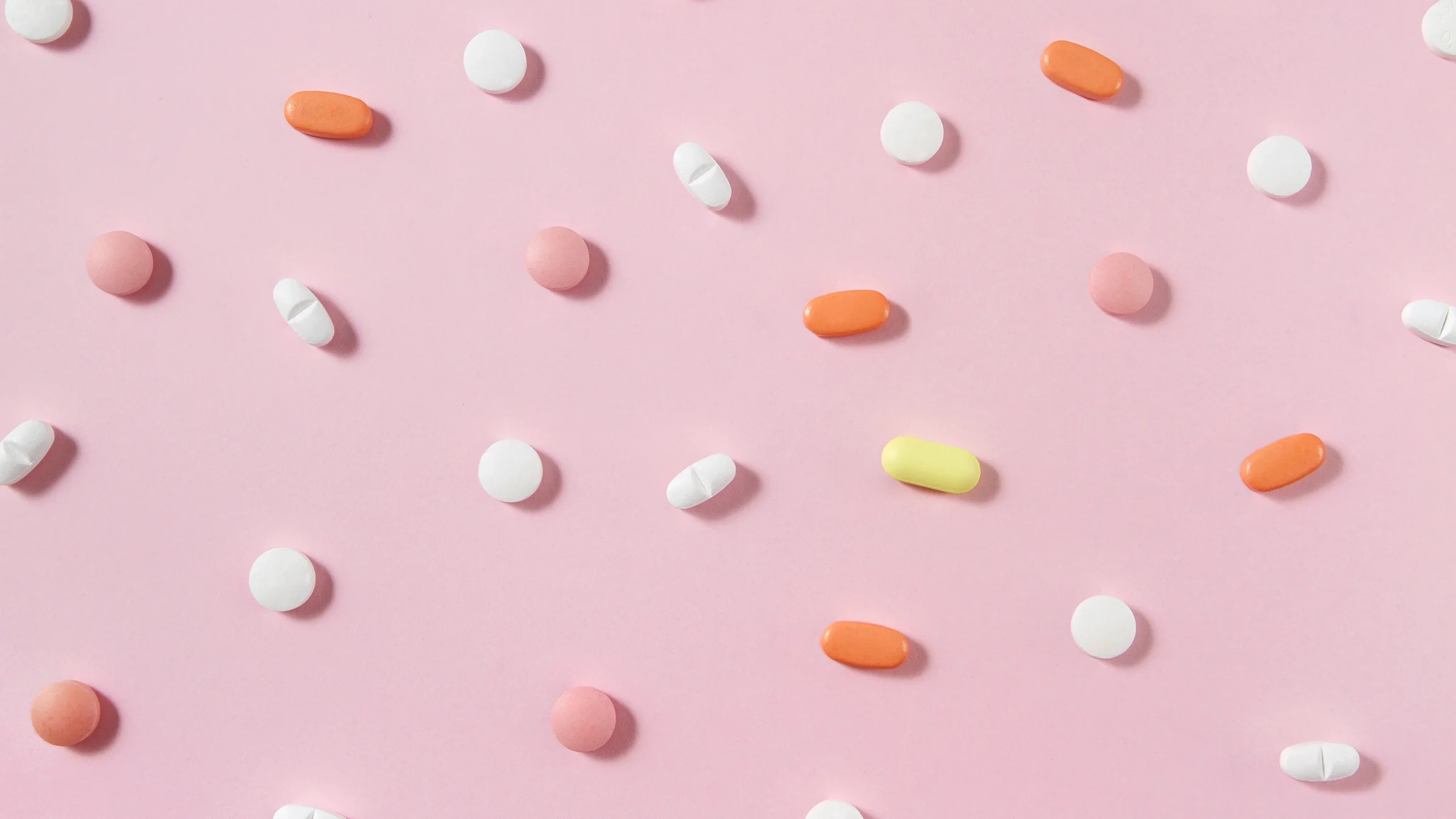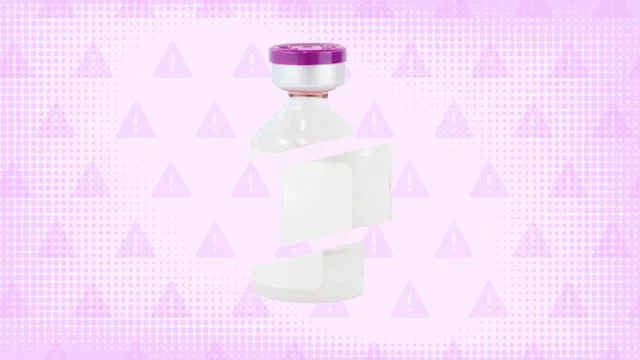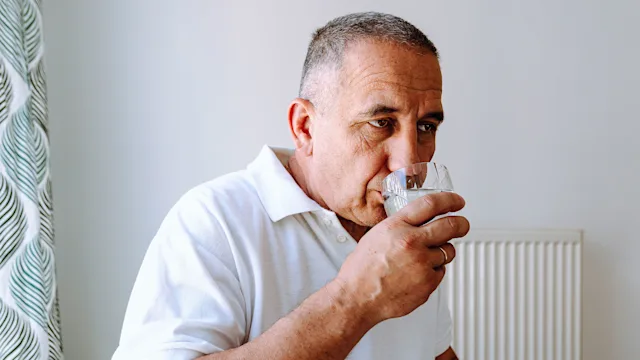Key takeaways:
Many medications can lower your body’s fluid levels. These effects are often mild, but some may cause you to lose a significant amount of water.
Medications that cause urination, diarrhea, or vomiting can leave you feeling thirsty or dehydrated. These include diuretics like furosemide (Lasix), laxatives like polyethylene glycol (Miralax), and many chemotherapy medications.
It’s always good to stay hydrated. But making sure to drink enough water throughout the day is especially important if you’re taking a medication that increases your risk of dehydration. If you think your medication is making you more thirsty than usual, it’s recommended to talk to your healthcare team.
Save on related medications
All medications and supplements can cause side effects. In some cases, this includes feeling thirsty or dehydrated.
Preventing and managing dehydration is important — especially if you’re taking a medication that increases your risk for it. Not only can a loss of body water make you feel thirsty, but it can sometimes lead to unintended health consequences. Headaches, dizziness, and dry skin affect many people with dehydration. Muscle cramps are possible too, amongst other effects.
Coming up, we’ll take a look at nine common types of medications that cause dehydration and how to manage the thirst they cause.
Search and compare options
1. Diuretics like Lasix
Diuretics are a large and useful class of medications. Many people casually refer to them as “water pills.” Diuretics include medications such as hydrochlorothiazide (Microzide), furosemide (Lasix), and spironolactone (Aldactone, CaroSpir). They manage health conditions such as high blood pressure and congestive heart failure.
Although each type of diuretic works a little differently, at the end of the day their goal is the same. They remove excess water through your urine to lower blood pressure and fluid buildup. But they can often leave you feeling thirsty as a result.
2. Anticholinergic medications like Bentyl
Anticholinergics are another large group of medications. They have a wide variety of uses, ranging from asthma and COPD (chronic obstructive pulmonary disease) management to overactive bladder and IBS (irritable bowel syndrome) support. Ipratropium (Atrovent HFA), oxybutynin (Ditropan XL, Oxytrol), and dicyclomine (Bentyl) are all common anticholinergics.
These medications work by preventing the neurotransmitter (chemical messenger) acetylcholine from working normally. This leads to their desired health benefit, but they can cause “drying” side effects at the same time. Difficulty urinating, lowered sweat production, and constipation are all common complaints.
These medications also cause your mouth to make less saliva. They may have you reaching for a beverage to alleviate the dry mouth sensation that goes along with it.
3. SGLT2 inhibitors like Jardiance
Sodium-glucose co-transporter-2 (SGLT2) inhibitors are increasingly popular medications that treat Type 2 diabetes, heart failure, and kidney disease. Medications such as canagliflozin (Invokana) and empagliflozin (Jardiance) are top examples.
Dry mouth causes: Dry mouth and dehydration sometimes go hand in hand. Read on for an overview of medications that cause dry mouth.
Fighting off dehydration: See which drinks are best for staying hydrated, from water and electrolyte drinks to smoothies.
When to seek help: Severe dehydration can be dangerous. It may be time to go to the ER if you’re experiencing issues such as confusion, fainting, and very dark urine.
Among other effects, SGLT2 inhibitors lower blood glucose (blood sugar) levels by forcing glucose to leave your body through your urine. But they can also increase the amount of urine you pass when you go to the bathroom. This slightly increases the risk of dehydration.
4. Blood pressure medications like lisinopril
Angiotensin-converting enzyme (ACE) inhibitors and angiotensin II receptor blockers (ARBs) are medications that manage high blood pressure. They’re long-term maintenance medications that help prevent serious heart-related health conditions, including heart attack and stroke.
Dehydration can be an unintended consequence of taking ACE inhibitors, such as lisinopril (Zestril), and ARBs, such as losartan (Cozaar), especially when they’re combined with a diuretic. This stems from how they affect your kidneys. They lower the amount of water and salt that the kidneys reabsorb, which means your body may be less efficient at preserving fluids.
5. Supplements and medications that contain caffeine
Caffeine is found in certain dietary supplements, such as pre-workout exercise products. Medications such as Excedrin (acetaminophen / aspirin / caffeine) and Fioricet (acetaminophen / butalbital / caffeine) also contain caffeine. This is the same chemical that provides the pick-me-up in your morning cup of coffee or tea.
Caffeine is a known diuretic. As mentioned previously, diuretics make you pee more often. Coffee and tea have enough water to balance out this effect, but medications, supplements, and foods that contain caffeine may leave you feeling more thirsty than normal.
Good to know: Dehydration can also cause headaches. The caffeine found in some headache medications and supplements may make your dehydration worse.
6. Laxatives like Miralax
Many laxatives are available for constipation relief. Stimulant laxatives, such as senna (Senokot, Ex-Lax), and osmotic laxatives, such as polyethylene glycol (Miralax), are common choices people turn to.
Some laxatives, such as senna, cause muscles in your intestine to move more quickly. Others, such as polyethylene glycol, pull in water from other parts of your body to your intestines. These effects can soften hard stools and move them along through your intestine to produce a bowel movement.
Laxatives may leave you feeling thirsty or dehydrated because of how they use your body’s fluids. Plus, laxative overuse can lead to diarrhea. And losing these extra fluids can contribute to dehydration.
Keep in mind: Dehydration itself can cause or contribute to constipation. So if you are already dehydrated, taking laxatives may use up even more of your body’s water, adding to your thirst.
7. Lithium
Lithium (Lithobid) is an older medication that many people still take today. It’s a mood stabilizer that treats bipolar disorder. At one point, it was even sold as a dietary supplement to help lessen hangover symptoms; it provided the up in the soft drink 7UP.
Lithium also causes increased urination for many people that take it. As with diuretics, this can lead to thirst and dehydration.
8. Antipsychotics like Haldol
Antipsychotics are another large group of medications. They treat health conditions such as schizophrenia, bipolar disorder, and hard-to-treat depression. Examples include haloperidol (Haldol) and risperidone (Risperdal, Rykindo, Uzedy).
Antipsychotics can leave you wanting water in more ways than one. Many antipsychotics can cause dry mouth as a side effect. They may also cause excess sweating — also called hyperhidrosis. These alone will have many people reaching for a glass of water.
What’s more, antipsychotics can cause a rare but serious side effect called neuroleptic malignant syndrome (NMS). NMS makes it difficult for the body to adjust its temperature. This leads to high body temperature — also known as hyperthermia — and excess drooling, sweating, and urination. All of these increase the risk for dehydration.
9. Several chemotherapy medications
Chemotherapy medications are life-saving medications used to treat cancer. They include treatments such as irinotecan (Camptosar, Onivyde), cyclophosphamide (Cytoxan), and many more.
These medications fight cancer by preventing cancer cells from growing and spreading. Cancer cells grow quickly in the body, so by targeting these rapidly dividing cells, cancer growth can be slowed down or stopped.
The downside is that healthy cells are also damaged during treatment, leading to side effects. Some of the most well-known side effects of chemotherapy are diarrhea, nausea, and vomiting. Frequent diarrhea and vomiting can cause your body to lose water it has stored and lead to dehydration.
Other medications that are linked to dehydration
There are many more medications that can increase the risk of dehydration.
Other top examples include:
Medications that cause diarrhea, such as antibiotics and metformin
Medications that increase urination, such as corticosteroids and theophylline (Elixophyllin, Theochron, Theo-24)
Medications that can make you vomit, such as opioids and dopamine agonists
Medications that make you sweat excessively, such as selective serotonin reuptake inhibitors (SSRIs) and nonsteroidal anti-inflammatory drugs (NSAIDs)
Medication that make you less thirsty, such as benzodiazepines and desmopressin (DDAVP, Nocdurna)
How can dehydration from medications be managed?
No matter if you’re taking medications or not, it’s important to drink water regularly throughout the day. Doing so keeps your body healthy and hydrated. This is better for you than drinking a lot of water all at once, too. The “right” amount of water depends on the person, so ask your healthcare professional for a daily quantity to aim for.
Still, dehydration isn’t always avoidable. The best way to manage dehydration from your medication depends on the medication you take and the reason you’re taking it. For instance, some medications are designed to remove excess water from your body. If you drink lots of extra water, it may prevent you from seeing the benefits of your medication.
If your medication is making you more thirsty than normal and you feel dehydrated, it’s always a good idea to check in with your healthcare team. Together you can take steps to decide what is the best way to quench your thirst. This can include things like keeping water close by to sip throughout the day and eating a diet with water-rich foods, such as fruits and soups.
Frequently asked questions
Dehydration is usually treated by replacing lost fluids and electrolytes — but not with regular pills. The most common treatment is an oral rehydration solution. These are drinks that contain a mix of water, salts, and sugars to help your body absorb fluids quickly. For more serious dehydration — especially in hospitals — healthcare teams may administer fluids through an IV (a needle in your vein). These fluids are special mixtures of electrolytes and water.
Several medications can affect the balance of electrolytes in your body. For example, diuretics are one common cause. They often lead to lower potassium or sodium levels. Other common drugs that may cause problems include certain antibiotics, chemotherapies, and corticosteroids. Laxatives and several medications that treat mental health conditions can cause dehydration, too.
Dehydration is usually treated by replacing lost fluids and electrolytes — but not with regular pills. The most common treatment is an oral rehydration solution. These are drinks that contain a mix of water, salts, and sugars to help your body absorb fluids quickly. For more serious dehydration — especially in hospitals — healthcare teams may administer fluids through an IV (a needle in your vein). These fluids are special mixtures of electrolytes and water.
Several medications can affect the balance of electrolytes in your body. For example, diuretics are one common cause. They often lead to lower potassium or sodium levels. Other common drugs that may cause problems include certain antibiotics, chemotherapies, and corticosteroids. Laxatives and several medications that treat mental health conditions can cause dehydration, too.
The bottom line
Many medications can cause dehydration. Common culprits include diuretics, laxatives, and chemotherapy medications. Blood pressure medications, lithium, and caffeine-containing supplements can also have this effect. If you think that your medications are making you more dehydrated or thirsty than usual, reach out to your healthcare team.

Why trust our experts?


References
Arumugham, V. B., et al. (2023). Therapeutic uses of diuretic agents. StatPearls.
Bashir, A., et al. (2024). Laxatives. StatPearls.
Bellis, M. (2019). The history of 7UP and Charles Leiper Grigg. ThoughtCo.
National Kidney Foundation. (2022). Hot topics: SGLT2 inhibitors and kidney disease.
Nickless, G., et al. (2022). Electrolyte disturbances: causes and management. The Pharmaceutical Journal.
Padda, I. S., et al. (2023). Sodium-glucose transport protein 2 (SGLT2) inhibitors. StatPearls.
Puga, A. M., et al. (2019). Effects of drugs and excipients on hydration status. Nutrients.
Purves, D., et al. (2001). Acetylcholine. Neuroscience, 2nd Edition. Sinauer Associates.
Singh, S., et al. (2023). Ringer’s Lactate. StatPearls.
Taylor, K., et al. (2025). Adult dehydration. StatPearls.














